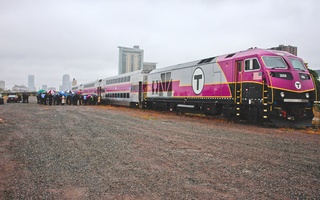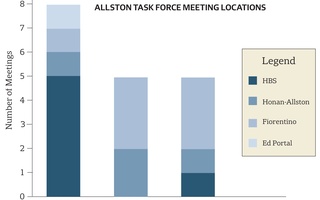Harvard detailed two updates to its Allston plans Thursday at a mostly conflict-free Harvard-Allston Task Force meeting.
Interim task force chair John A. Bruno opened the meeting with the display of his new gavel, a gift from an Allston resident.
“You may regret it,” said Bruno, brandishing the gavel towards the audience.
Bruno characterized his last consultation with Kevin Casey, Harvard’s associate vice president for public affairs and communications, as “spirited,” and said he hoped for accord and civility in the meeting to follow.
Casey led the discussion and gave an overview of the University’s first and second amendments to its Institutional Master Plan for development in Allston. The Boston Redevelopment Authority, Boston’s urban planning agency, had published both amendments online in the last two weeks.
In particular, Casey discussed Harvard’s decision to relocate the energy facility intended to service the University’s proposed $1 billion complex for the School of Engineering and Applied Sciences.
Casey also detailed Harvard’s plans to renovate Harvard Business School student housing along the Charles River and to temporarily realign Western Avenue to reduce traffic congestion caused by SEAS complex construction, slated to begin in 2016 and continue through 2020.
“Over the course of the four years of this project there will be continuous service and we won’t be disrupting the flow of cars, bikers, and walkers,” Casey said.
Harvard will file its official plans to renovate Business School housing with the BRA next month, Casey said. He added that the renovations will take place over a four-year period so that the school can continue to provide housing to students during construction.
In response to community feedback on preliminary designs, Casey presented an update to the design of Harvard’s Life Lab, a biotechnology research and enterprise facility scheduled to open in fall of 2016. The new design features an improved front on Western Ave., more windows, and enhanced landscaping around the building.
Casey highlighted the community benefits Harvard has proposed in connection with the Life Lab. Along with ice cream socials held at the i-Lab, the Business School will provide access to Chromebook laptops for every K-12 public school student in Allston and Brighton.
Near the close of the meeting, Thomas M. Lally, an Allston resident and regular meeting attendee, questioned the task force’s process for nominating and selecting the body’s members. Invoking the Bill of Rights, Lally called for direct community involvement in the election of task force representatives.
“The community has a concern that we aren’t comfortable with the BRA and Harvard sitting down and deciding how they’re going to represent us,” said Lally.
Bruno, who has in the past expressed frustration with what he called the inefficiency of task force meetings, had a different take on member selection.
“The substance of what we need to do and read about is significantly more important than the folks that are going to represent you. Really,” Bruno said.
–Staff writer Jonah S. Lefkoe can be reached at jonah.lefkoe@thecrimson.com. Follow him on Twitter @JonahLefkoe.
–Staff writer Hannah Natanson can be reached at hannah.natanson@thecrimson.com. Follow her on Twitter @hannah_natanson.Read more in News
Gov. Course Puts Presidential Politics Under the Microscope

















